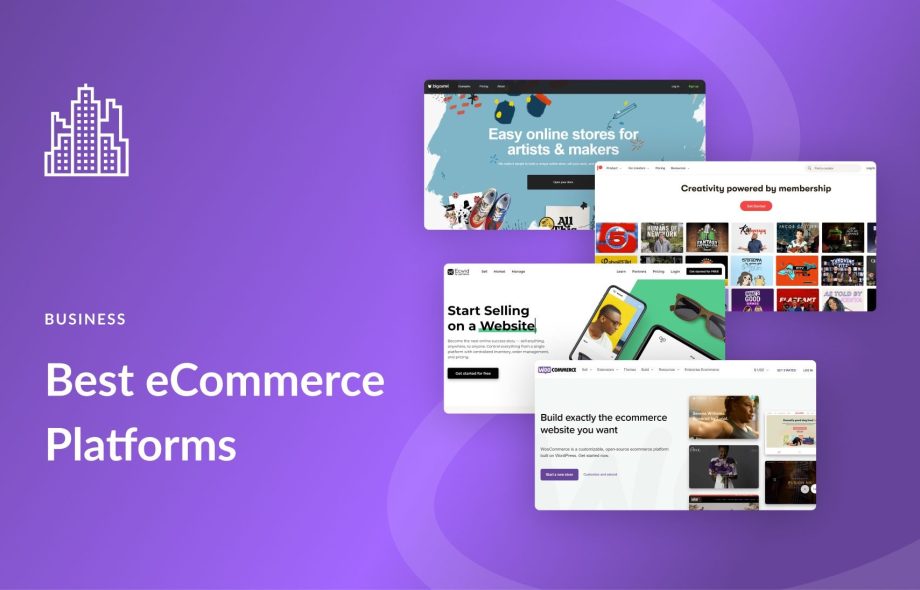As the world of ecommerce continues to thrive, businesses face the crucial decision of choosing the right platform to support their online ventures. Whether you’re a startup or an established enterprise, selecting a platform that offers scalability, flexibility, and customizability is essential. This guide explores the top ecommerce platforms that can drive growth and meet your business’s evolving needs.
What Makes a Platform Scalable for Ecommerce?
Scalability in e-commerce means the platform can grow alongside your business. It should handle increased traffic, product listings, and transactions without compromising performance. The best platforms also allow for custom ecommerce website development, ensuring your store reflects your brand identity and meets your customers’ unique requirements.
1. Shopify: User-Friendly and Versatile
Shopify is one of the most popular ecommerce platforms, catering to businesses of all sizes. Its ease of use, extensive app marketplace, and robust features make it a top choice for entrepreneurs.
Key Features:
- Scalability: Shopify’s plans cater to businesses ranging from startups to enterprises with Shopify Plus.
- Customization: With a variety of themes and support for custom ecommerce website development, you can design a store that suits your needs.
- App Ecosystem: Shopify’s app store includes tools for marketing, SEO, analytics, and inventory management.
- Global Reach: Multilingual capabilities and multiple payment gateways support international expansion.
However, Shopify does have limitations in terms of advanced customization without developer assistance.
2. WooCommerce: Flexibility for WordPress Users
If you’re already familiar with WordPress, WooCommerce is a natural extension to turn your site into a powerful online store. This open-source platform offers endless customization options.
Key Features:
- Integration with WordPress: Seamlessly integrates with WordPress websites, leveraging its vast plugin ecosystem.
- Custom Development: Developers can create tailor-made features, ensuring your store meets specific business requirements.
- Cost-Effectiveness: The base plugin is free, with premium extensions available for additional functionality.
- Community Support: A large community of users and developers means extensive resources are available for troubleshooting and enhancement.
WooCommerce requires technical expertise for optimal use, especially when scaling to large stores.
3. BigCommerce: Built for Growth
BigCommerce is designed for businesses seeking an all-in-one solution to support rapid growth. It’s particularly suitable for medium to large-scale enterprises.
Key Features:
- Scalability: No transaction fees and unlimited bandwidth allow your store to grow without hidden costs.
- Customization: Offers APIs and tools for custom ecommerce website development, enabling complex integrations.
- SEO Excellence: BigCommerce is known for its advanced SEO capabilities, helping you rank higher on search engines.
- Multi-Channel Selling: Sell directly on Amazon, eBay, and social media platforms.
While BigCommerce provides advanced features, it may come with a steeper learning curve for non-technical users.
4. Magento (Adobe Commerce): Enterprise-Grade Power
Magento is the go-to choice for large-scale businesses that require extensive customization and scalability. Now known as Adobe Commerce, this platform offers unparalleled flexibility.
Key Features:
- Custom Development: Magento is open-source, making it perfect for businesses requiring bespoke features.
- Scalability: Handles extensive product catalogs and high traffic volumes with ease.
- Advanced Features: Includes built-in marketing tools, analytics, and support for multiple storefronts.
- Integration: Compatible with a wide range of third-party systems, such as ERP and CRM software.
Magento’s complexity and resource demands make it best suited for businesses with dedicated development teams.
5. Wix eCommerce: Beginner-Friendly with Creative Freedom
Wix eCommerce is an excellent choice for small businesses and creative entrepreneurs looking for simplicity and visual appeal.
Key Features:
- Ease of Use: Drag-and-drop builder makes it easy to create a professional-looking store without coding.
- Customizable Designs: Choose from hundreds of templates or use custom ecommerce website development for unique designs.
- Integrated Marketing Tools: Built-in email marketing, social media integrations, and SEO tools.
- Affordable Pricing: Offers competitive plans tailored for small-scale operations.
While Wix excels in simplicity, it may lack the advanced scalability needed for larger enterprises.
6. Squarespace: Design-Centric Ecommerce
Squarespace combines elegant design capabilities with solid ecommerce functionality, making it a favorite among creatives.
Key Features:
- Award-Winning Templates: Visually stunning designs for a polished online presence.
- Integrated Tools: Built-in SEO, analytics, and email marketing tools.
- Custom Development: Although limited compared to other platforms, it supports basic customization for ecommerce needs.
- Subscription Features: Excellent for businesses offering memberships or subscription services.
Squarespace is ideal for smaller businesses but may not provide the scalability or advanced features required by growing enterprises.
7. Custom Ecommerce Website Development: Tailored Solutions
For businesses with unique needs, opting for custom ecommerce website development offers unmatched flexibility. By working with experienced developers, you can create a platform that aligns perfectly with your business goals.
Advantages:
- Complete Customization: Tailor every aspect of your online store, from design to functionality.
- Scalability: Build a platform that can handle growth without limitations.
- Integration: Seamlessly connect with third-party systems and tools.
- Enhanced User Experience: Design customer journeys that reflect your brand’s identity.
While custom development requires more time and investment, it’s the best option for businesses seeking a unique and scalable solution.
How to Choose the Right Platform for Your Business
Selecting the best ecommerce platform depends on your business size, goals, and technical capabilities. Consider the following factors:
- Budget: Evaluate upfront costs and long-term expenses, including hosting, plugins, and transaction fees.
- Scalability: Choose a platform that can grow with your business.
- Customization: Determine whether you need basic templates or advanced custom development.
- Ease of Use: Ensure the platform is user-friendly for your team.
- Support and Resources: Opt for a platform with reliable customer support and a strong user community.
Conclusion
The ecommerce platform you choose can significantly impact your business’s success. From user-friendly options like Shopify and Wix to advanced solutions like Magento and custom ecommerce website development, there’s a platform for every need. Take the time to assess your requirements and choose a solution that supports your vision for growth.

